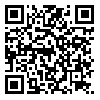1- Farhangian University
Abstract: (1628 Views)
Background & Objectives: Nowadays one of the most controversial and common disorders in childhood and adolescence is attention deficit hyperactivity disorder (ADHD). This disorder is defined by persistent symptoms of inattention, hyperactivity, and impulsivity. Impulsivity describes a set of heterogeneous traits or behavioral patterns, e.g., the inability to consider the desirable outcomes of the future. Numerous definitions of impulsivity have been provided, emphasizing certain concepts such as disregard for the consequences of actions and impatience. Resilience is one of the modern psychological constructs derived from positive psychology. Although various definitions of resilience have been proposed, most of them refer to resilience as the ability to adapt to hardships and stressful life events, e.g., social interactions. Social skills are the learned social behaviors that involve interacting with others, enabling individuals to function competently in social situations. Research evidence indicates that children with ADHD have social skill problems, peer rejection, social isolation, and a lack of self-acceptance and acceptance by peers. Self-regulation intervention is one of the most common psychological interventions, which has been widely used in psychological sciences and can be effective in reducing impulsivity and improving resilience and social skills in children with ADHD. Therefore, this study aimed to analyze the effectiveness of the child self-regulation training program in reducing impulsivity and improving resilience and social skills in children with ADHD.
Methods: This quasi-experimental research adopted a pretest-posttest control group design. The statistical population consisted of all male second-graders diagnosed with attention deficit hyperactivity disorder (ADHD) during the 2023–2024 academic year. The research sample included 30 students diagnosed with ADHD, selected using convenience sampling based on inclusion criteria. They were then randomly assigned to two groups of 15—an experimental group and a control group. The research instruments included the Barratt Impulsiveness Scale (1995), the Connor–Davidson Resilience Scale (2003), the Matson Evaluation of Social Skills with Youngsters (1983), and the Self-Regulation Training Program developed by Nazemi et al. (2023).
Results: Before the multivariate covariance analysis, the assumptions of normal data distribution were examined and confirmed using the Kolmogorov–Smirnov test, the homogeneity of variances using Levene's test, and the assumption of homogeneity of variance-covariance matrices using Box's M test. The results demonstrated that the child self-regulation training program significantly reduced the mean impulsivity variable and increased the mean social skills and resilience variables (P < 0.001) in the experimental group compared to the control group in the post-test stage after the pre-test effects were controlled. This training program was effective in the post-test stage, reducing impulsivity by 40.6%, increasing social skills by 50.5%, and enhancing resilience by 46.7% among the children. The self-regulation program can internalize social skills, as well as the importance and necessity of rules in children with ADHD, enabling them to generalize the learned skills to various situations. Children with ADHD often face numerous challenges, e.g., communication and emotional difficulties. The self-regulation training program can teach emotion management and enhance skills related to resilience, social adaptation, and the prevention of inappropriate emotional responses.
Conclusion: As per the research findings, children with ADHD are expected to improve their competencies, e.g., their academic performance, through the skills learned from this program.
Methods: This quasi-experimental research adopted a pretest-posttest control group design. The statistical population consisted of all male second-graders diagnosed with attention deficit hyperactivity disorder (ADHD) during the 2023–2024 academic year. The research sample included 30 students diagnosed with ADHD, selected using convenience sampling based on inclusion criteria. They were then randomly assigned to two groups of 15—an experimental group and a control group. The research instruments included the Barratt Impulsiveness Scale (1995), the Connor–Davidson Resilience Scale (2003), the Matson Evaluation of Social Skills with Youngsters (1983), and the Self-Regulation Training Program developed by Nazemi et al. (2023).
Results: Before the multivariate covariance analysis, the assumptions of normal data distribution were examined and confirmed using the Kolmogorov–Smirnov test, the homogeneity of variances using Levene's test, and the assumption of homogeneity of variance-covariance matrices using Box's M test. The results demonstrated that the child self-regulation training program significantly reduced the mean impulsivity variable and increased the mean social skills and resilience variables (P < 0.001) in the experimental group compared to the control group in the post-test stage after the pre-test effects were controlled. This training program was effective in the post-test stage, reducing impulsivity by 40.6%, increasing social skills by 50.5%, and enhancing resilience by 46.7% among the children. The self-regulation program can internalize social skills, as well as the importance and necessity of rules in children with ADHD, enabling them to generalize the learned skills to various situations. Children with ADHD often face numerous challenges, e.g., communication and emotional difficulties. The self-regulation training program can teach emotion management and enhance skills related to resilience, social adaptation, and the prevention of inappropriate emotional responses.
Conclusion: As per the research findings, children with ADHD are expected to improve their competencies, e.g., their academic performance, through the skills learned from this program.
Keywords: attention deficit hyperactivity disorder (ADHD), impulsivity, child self-regulation, social skills
Type of Study: Original Research Article |
Subject:
Psychology
Send email to the article author
| Rights and permissions | |
 |
This work is licensed under a Creative Commons Attribution-NonCommercial 4.0 International License. |


